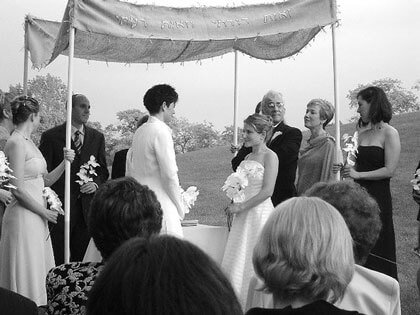Legal issue grow murkier as some couples make the trip
New Yorkers Catherine and Sheila Marino-Thomas had planned to travel on Thursday, May 27, to Provincetown, Massachusetts, to get legally married. They have been partners for 11 years, are raising a child, who is four, and pledged their commitment to each other in a commitment ceremony, also in Provincetown, in 1995.
But as the couple was preparing to hit the road, the town of Provincetown announced a decision to stop issuing marriage licenses to couples who are not residents of the state.
“I will try to follow the system,” said Catherine. “But I’m loud. Let them go ahead and refuse me.” She said she plans to “write a letter to the town clerk [of Provincetown] and deliver it personally.”
The suspension is temporary, said Provincetown officials, but it is entirely unclear how or when the town intends to resume issuing licenses to all who apply. The suspension came in response to a demand made by Mitt Romney, the Massachusetts governor, a staunch Republican, and follower of the Mormon faith, who has battled the state’s Supreme Court ruling to legalize gay marriage from its outset. His requirement that couples seeking marriage licenses also be residents of the state or attest to their intention to move there is Romney’s latest trump card.
The governor is basing his stipulation on an extremely broad interpretation of an already archaic statute, on the books since 1913, that says the state cannot perform marriages of out-of-state couples which would be void in their home state. The law was passed as a measure to prevent interracial marriages and has not been enforced in anyone’s memory, say Massachusetts lawmakers. Romney has interpreted “void” to mean not formally recognized, thereby folding all the other states into his prohibition.
Opinions issued by Eliot Spitzer, the New York attorney general, as well as the attorneys general of Connecticut, Rhode Island, and Vermont, saying that there is no impediment to their states recognizing same-sex marriages performed in Massachusetts, pose a challenge to Romney’s edict. In fact, Spitzer, for one, forwarded his opinion, issued in early March, to Romney, though there is no word on how the Massachusetts governor responded.
Romney’s policy on out-of-state marriage has set off a series of pronouncements from the state government on an almost daily basis that address some municipalities but not others. Four Massachusetts towns, Provincetown among them, had originally pledged to defy the governor, allowing any couple to marry, regardless of whether they affirmed an intent to move to the state, but were pressured by Romney into backing down. But since Massachusetts Attorney General Thomas Reilly, acting on the instruction of the governor, specifically instructed those four towns alone to “cease and desist” from issuing licenses to out-of-state couples, two other Massachusetts towns, Attleboro and Fall River, which were formerly compliant with Romney, felt free on May 25 to begin issuing licenses to couples from the eleven other states that have not adopted specific bans on gay marriage.
“It’s going to be a mess,” said David Thompson, co-chair of the activist organization Marriage Equality New York.
He said that in the end, the issue is not that “some couples from some states can sometimes get married” in Massachusetts, but that “if we’re going by the letter of the law, those marriages are legitimate here. That law [upon which Romney is relying] should not be applicable to New York.”
Some closely involved with the marriage equality struggle in New York State argue that the ban on out-of-state couples will effectively create two classes of citizens in New York, those who have their marriages recognized and those who do not.
New York Assemblymember Danny O’Donnell, an out gay Manhattan Democrat, said that people with a “sufficient nexus” between New York and Massachusetts will be able to slip by the residence requirement, creating a situation in which marriage rights are acquired through class standing.
“There are going to be people who either [have a place] in the Berkshires [in Massachusetts] and also in New York State, or live in Manhattan and have a summer home in Provincetown,” he said. “That creates a two-class structure. We can’t have a situation where you don’t get rights and responsibilities if you either don’t have the means or the nexus. It’s unconstitutional.”
O’Donnell, who is a litigant in a case against the state involving 14 couples who want to get legally married here, concluded, “You should have the same rights in New York State and that’s what we’re fighting for.”
“I don’t know if it creates two classes as much as it creates a tremendous amount of confusion about whether you’re married or not,” said Eric Wrubel of the Manhattan law firm Dobrish & Wrubel, an attorney in another same-sex marriage law suit against New York State. “The real problem for New York is you’re going to get married couples coming from Massachusetts who will get rights but I, who might not have the financial means to go to Massachusetts to get married, don’t get rights. That creates serious constitutional problems in the state.”
With the legal and political landscape so heated over same-sex marriage, little attention has been paid to celebrating those couples who have married.
Shelley Curnow and Deborah Reichman claim bragging rights as the first same-sex couple whose legal marriage, formally recognized by a court in the United States, was announced in The New York Times Weddings and Celebrations pages. The marriages of three other lesbian and gay couples were also written up this past Sunday in The Times, but as Reichman said, “We were in the first column.”
Unlike the other three couples, Curnow and Reichman, who were married May 22 by Rabbi Sigma Faye Coran at the Eastover Resort in the Berkshires, are not residents of Massachusetts. They live in New York City.
But the couple emphasized that their celebration was in no way a reaction to the legal and political cycles in Massachusetts.
“We just had a huge wedding in Massachusetts that we planned for over a year,” said Reichman. “We picked that date and place long before any of this and the Supreme Court [of Massachusetts] had to catch up to us.”


































